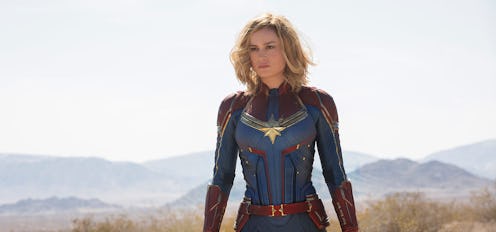Entertainment
Being A Female Marvel Fan Means Loving Its Evolution — But Not Every Flaw

On Monday, Nov. 12, Stan Lee, co-creator of Marvel comics and patron saint of all superhero lovers, died at the age of 95. It's hard to put into words just how big a legacy he leaves. The man created some of the most enduring fictional characters in comics and beyond — the Fantastic Four, Iron Man, the Incredible Hulk, Black Panther, and so many others. But, Lee was not without his faults, and the fandom he created was and remains undoubtedly flawed. And to exist in the Marvel fandom as a woman is to love the evolution of the comics and the characters, if not necessarily their world overall.
I first became a Marvel fan as a teen after watching the wave of early 2000s Marvel adaptations — Spider-Man (2002), X-Men (2000), and Fantastic Four (2005) — but while watching Tobey Maguire jump around New York City and lusting after Chris Evans was thrilling, I didn't totally fall in love until Captain America: The First Avenger. That film showed how the comic book movie genre could challenge action movie tropes, and that a Hollywood blockbuster literally called Captain America could both question American patriotism and propaganda and feature an anti-damsel in distress love interest like Peggy Carter certainly didn't hurt either.
Eventually, my love of Marvel movies grew so intensely that I thought it was time to take my fandom to the next level by signing up for a college course on the graphic novel. I hoped it would lead to a comics obsession, but spoiler alert: it didn't. The first comic we read was one of the very first Fantastic Four issues, and let me tell you, I have never struggled so much to get through a 20-odd page reading assignment. The characters were imaginative, fun, and infectious, but I found myself utterly bored by the emphasis on white men and the consistent sidelining of the female characters.
Marvel was not alone in this, not by a long shot, as DC and other publishers have also long been guilty of sexism in their comics (just read early Lois Lane comics if you don't believe me). But the fact is that what I learned reading those comics and watching the movies is that Marvel's history of sidelining women and people of color is not something that I'm willing to ignore. I can't just embrace all of Marvel as a whole, nor can I be too precious about the original (and sometimes offensive) material. What I can do is look at the evolution of these beloved characters and stories, and I can love and respect that instead.
Take Black Panther. In 1966, Marvel created the first major black superhero in pop culture, but his portrayal wasn't without problems. The Ringer notes that the first panel that mentions him, from Fantastic Four no. 52, features The Thing referring to Black Panther as "some refugee from a Tarzan movie" and doesn't even feature T'Challa himself. Over time, however, and over the span of multiple writers and artists, the character of Black Panther changed, until, finally, he became not only a more well-rounded and complex character, but also the lead of one of Marvel's most successful movies to date.
It's an evolution you can also see onscreen in the MCU with its female characters. When Scarlett Johansson's Black Widow was introduced in Iron Man 2 (2010), it wasn't as an ex-Russian spy turned superhero, but just as Tony Stark's sexy secretary "Natalie." One scene even showed pictures of her in lingerie. It was sexist and offensive, but over the last eight years and almost as many movies, Black Widow has transformed into a fierce warrior. These days, she's on equal footing with her male counterparts like Tony Stark and Captain America. (Yet that doesn't mean that I have forgotten how she still doesn't have a solo movie.)
Black Widow's evolution wasn't perfect, just as Black Panther wasn't perfect, because Marvel itself is not perfect. As a female fan, I cannot accept everything Marvel gives me blindly, and as an Asian American, a member of an ethnic group all too often ignored or stereotyped by superhero stories, I refuse to. But neither can I turn my back on the entire franchise. I love it too much. I love watching good guys defeat bad guys. I love watching Bruce Banner struggle with his humanity and the anger inside of him. I love that I get to watch women like Scarlet Witch, Valkyrie, and Gamora become three-dimensional characters who are also great at kicking butt.
But to love Marvel, for me, does not mean loving its flaws. I can't love how Mantis was repeatedly called ugly by Drax in Guardians of the Galaxy Vol. 2, or how Doctor Strange whitewashed the character of the Ancient One, or how under-written the female characters of Spider-Man: Homecoming were. I definitely cannot love the fact that 2019's Captain Marvel will be the MCU's first movie with a female superhero headliner. And I certainly cannot ignore the allegations of sexual misconduct levied against Lee, one from a massage therapist in Chicago, and others from a nursing company that claimed he sexually harassed multiple female nurses he employed. (Lee denied all allegations against him.)
I love what Marvel has given me so far, but I demand more. And what I love most about being a female Marvel fan is what I hope it will give me in the future: a world full of superheroes of all ethnicities and gender identities. A world where everyone can find a superhero that speaks to them.